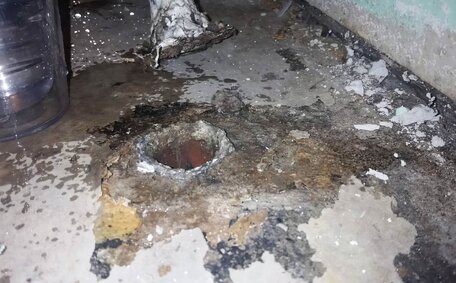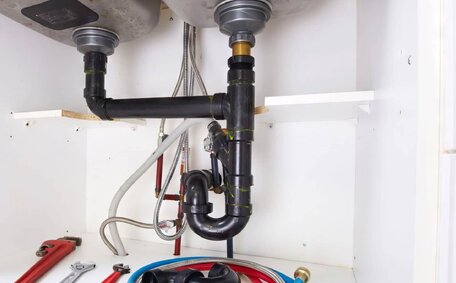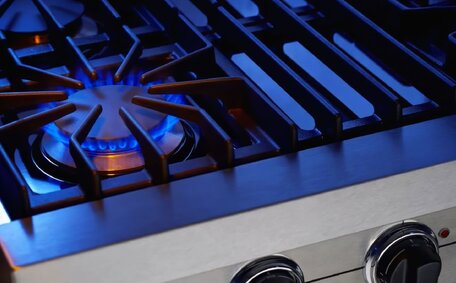Introduction: The Dangers Lurking in Your Kitchen Drain
Consistent accumulation of food scraps, fats, oils, and other debris can lead to blockages in kitchen drains. If left unchecked, these materials will cling to drain pipes, restricting water flow and providing a haven for bacteria, mould, and other contaminants.
Blocked drains not only lead to unpleasant odours and sink backups but also heighten the risk of water damage, compromised indoor air quality, and expensive drainage system repairs.
Common kitchen routines often contribute to drain blockages, impacting sewage treatment systems. Residue from soap and cleaning products can accumulate gradually as well.
Disposing of fats, oils, and grease in kitchen sinks is a significant cause of thick and sticky drain blockages. Disposing of food waste down the drain introduces solids that snag debris, leading to blockages. Neglecting drain maintenance can result in clogged pipes, which slow water flow and enable contaminants to accumulate.
As your local Sydney drain specialists for over 10 years, Bankstown Plumbing understands the dangers lurking beneath your sink and how to protect your home’s plumbing from harm. Bankstown Plumbing offers expert drain cleaning services and helpful tips to modify cooking habits for better drain health, ensuring safe and smooth water flow.
Contact us today for more information.
The Causes of Clogged Drains: Grease, Food and More
Many of the most common kitchen substances contribute to slow, blocked drains over time. Fats, oils, and dairy products have a significant impact — when washed down sinks, they cool and congeal into thick deposits lining pipe interiors. Known as 'fatbergs’, these grease blockages trap passing food particles and debris, growing in size and obstructing water flow.
Scraps and small foreign objects washed down the sink can also build up gradually. Solid particles like coffee grounds, eggshells, and tiny food bits become lodged, accumulating layer upon layer of grime. As this sticky mixture solidifies, it narrows the drain, reducing capacity.
Even residue such as hair soap, scum, and other hygiene products accumulate. Hair, soap scum, and chemicals react with pipes, restricting flow. Without vigilant drain care, Congestion from debris and residue buildup leads to foul odours, backed-up water, leakage risks and bacteria growth.
Avoid clogged drains by properly disposing of cooking fats and employing sink strainers to catch food remnants, preventing debris accumulation in pipes. Regularly flush pipes with hot water other alternatives can avoid overuse of chemicals, and call professionals like Bankstown Plumbing for scheduled maintenance.
How Cooking Impacts Your Drainage System
Many common cooking practises directly harm drainage systems over time. Leftover cooking grease congeals into solid lumps when cooled.
Disposing of oils, fats, or greasy residues from food production into sinks without proper sanitation measures can lead to clogged pipes. These sticky ‘fatbergs’ entrap food scraps and other debris passing through, what consider as forming blockages.
Removing a grease clog carries a significant cost, averaging $250 – highlighting the consequences of improper disposal.
Washing large volumes of any food production facility waste directly down drains also causes problems. Solids like rice or pasta swell when wet, clinging inside pipes. Other scraps from such food production facility introduce solid contaminants that must be filtered out.
Excess fats, oils and solids from cooking should be collected and disposed of responsibly in a garbage disposal to protect pipes and your septic tank.
Employ fine mesh sink strainers post-dishwashing to block food particles from entering your pipes.
Contact Bankstown Plumbing to clean your home drainage and safeguard it against cooking-related issues. With over a decade maintaining Sydney’s pipes, we have the expertise to optimise your kitchen’s drainage.
The High Costs of Drain Repairs and Cleaning
Blocked and damaged drains can result in widespread drainage issues, costly and inconvenient to fix. Clearing a blocked sewer line typically requires methods outside of traditional sewage treatment and can cost upwards of $150, while more serious blockages like tree root invasions or collapsed pipes can cost thousands to mend.
Grease fat clogs are especially problematic, with statistics showing removal averaging $250 per instance. As small amounts of congealed oil and debris accumulate over time, pipes become almost completely blocked, requiring high-pressure jetting and snaking to clear.
Seeking professional drain cleaning up procedures right away as soon as flow slows prevents minor clogs, which can evolve into major blockages. While a simple sink clog cleaning may start around $99, leaving the issue to worsen requires you to call professional repair services.
Regular maintenance, like Bankstown Plumbing’s Drain Care Programme, ensures your pipes remain clear. Our plumbers provide scheduled inspections and treatments, keeping paths clear. Investing in prevention reduces future costs while extending your plumbing lifespan.
Preventing Clogs: Proper Disposal of Fats, Oils and Food Waste
To prevent expensive clogged drains, never dispose of grease down your drain, and ensure correct disposal of fats, oils, and food waste. Here are tips to keep your kitchen drainage clear:
Collect Waste Cooking Oils
Post-cooking, refrain from pouring oily residue down the drain during cleaning. Allow oil to fully cool before transferring away from your drain into sealable containers for bin disposal. Congealed fats, such food residue that stick inside the drain pipe should never be poured down the sink.
Recycle Cooking Grease
Many councils offer household cooking oil recycling programmes, accepting used vegetable oils with high nutrient content for conversion into useful products like biofuel, soap or cosmetics. Enquire with your local waste authority to find a nearby collection centre.
Use Fine Mesh Drain Filters
Prevent small food particles from slipping down the drain during cleanup by fitting sink strainers, a common practice. Stainless steel mesh or cage filters are affordable additions catching debris, helping to reduce amount of buildup in pipes.
Avoid Direct Food Waste Disposal
To keep solid waste from entering your drainage system, avoid disposing of large amounts of food scraps or unused ingredients down the sink. Compost appropriate food waste or responsibly utilize general waste bins for disposal.
When to Call a Professional Plumber
While home remedies can address minor drain problems, consider professional help for serious clogs or pipe issues. We recommend contacting qualified plumbers in the following situations:
Total Drain Blockages
If drains remain backed up after using boiling water, plungers, or drain snakes, urgently call a plumber to prevent overflow and water damage. Total blockages usually need high-powered jetting machinery to remove.
Slow-Draining Sinks/Foul Odours
Gradually draining water accompanied by sewer gas smells when cleaning the sink indicates deposits and debris accumulating inside pipes, which can have consequences for the sewer system. Letting minor clogs worsen into major blockages risks expensive repairs - early intervention by drainage specialists stops the issue compounding.
Leaking/Damage Around Drains
Signs of water damage or visibly leaking joints/cracks suggest areas where there may be pipework damage beyond simple clogs, potentially jeopardising your health. Professionals have specialised tools equipment to inspect drainage lines and mend such defects before they deteriorate foundations or walls.
For affordable drain solutions from qualified local experts with more than 10 years experience, contact Bankstown Plumbing via the provided email address or on 1300 349 338.
Maintaining Healthy Drains and Promoting Home Hygiene
Preventing a blocked drain to minimise risk in your daily maintenance, which should be tailored to your home’s specific needs. Here are tips for keeping pipes clear and promoting household health:
Clean Sinks/Strainers Daily
Regularly check sink strainers and pipes for debris to prevent clogs after washing your hands. Rinsing away accumulated fats, hairs or food particles improves flow and reduces contamination risks.
Flush Pipes Weekly
Weekly flushing with 2 cups of baking soda and white vinegar helps eliminate pipe scale, clearing fatty deposits before they solidify. Finish by running hot water to rinse loosened residue.
Avoid Harsh Chemicals
Although some commercial drain cleaners containing lye or acid can be effective, they may corrode pipes with prolonged use. For a gentler approach to unclogging your drains, opt for hot water, plungers, or enzyme cleaners.
Install Drain Screens
Installing drainage screens with wider openings in bathrooms and laundry rooms can catch hair and debris, reducing buildup in household drains. Screens are designed for an easier clean, being removable.
Check for Leaks
Inspect joints and connections regularly for moisture or drips which are potential entry points for cracks allowing seepage. Early leak detection prevents costly water damage and health hazards.
Adopting simple drain care practices can lead to cleaner pipes, fewer blockages, and the assurance of dependable plumbing. Contact Bankstown Plumbing on 1300 349 338 for advice catering your property’s needs.






